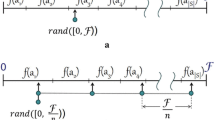Abstract
Local trust systems are used independently by participants of a mobile ad hoc network in order to build direct and indirect reciprocity-based cooperation in packet forwarding. They enable nodes to distinguish between selfish (untrustworthy) and cooperative (trustworthy) users. The type of information used to evaluate the behaviour of other network participants impacts the performance of such systems. Depending on whether the information considers the status of a node’s own packets or the packets of others, it can be partitioned into personal and general classes. In this paper we show that the size of the network should have an influence on a node’s decision whether to use personal or general data classes by its trust system. To demonstrate this we use an evolutionary approach based on replicator dynamic. The results obtained using the approach and computer simulation allow us to predict how data classes might be used for trust evaluation by independent network users acting out of self-interest. Our simulation studies demonstrate that, in the presence of a small number of nodes, a node should evaluate the level of cooperation of other network participants using personal and general data. However, if the network size is large, then relying on personal data only is the best choice for the node.
Access this chapter
Tax calculation will be finalised at checkout
Purchases are for personal use only
Preview
Unable to display preview. Download preview PDF.
Similar content being viewed by others
References
Buchegger, S., Boudec, J.Y.L.: Performance analysis of the CONFIDANT protocol. In: Proc. 3rd International Symposium on Mobile Ad Hoc Networking and Computing (MobiHoc 2002), pp. 226–236 (2002)
Buchegger, S., Boudec, J.Y.L.: The effect of rumor spreading in reputation systems for mobile ad-hoc networks. In: Proc. Workshop on Modeling and Optimization in Mobile, Ad Hoc and Wireless Networks (WiOpt 2003), pp. 131–140 (2003)
Buchegger, S., Boudec, J.Y.L.: A robust reputation system for p2p and mobile ad-hoc networks. In: Proc. Second Workshop on the Economics of Peer-to-Peer Systems (2004)
Carruthers, R., Nikolaidis, I.: Certain limitations of reputation-based schemes in mobile environments. In: Proc. 8th ACM international symposium on Modeling, analysis and simulation of wireless and mobile systems (MSWiM 2005), pp. 2–11 (2005)
Feldman, M., Papadimitriou, C., Chuang, J., Stoica, I.: Free-riding and whitewashing in peer-to-peer systems. IEEE Journal on Selected Areas in Communications 24(5), 1010–1019 (2006)
He, Q., Dapeng, W., Khosla, P.: SORI: a secure and objective reputation-based incentive scheme for ad-hoc networks. In: Proc. Wireless Communications and Networking Conference (WCNC 2004), vol. 2, pp. 825–830 (2004)
Jensen, C.D., Connell, P.O.: Trust-based route selection in dynamic source routing. In: Stølen, K., Winsborough, W.H., Martinelli, F., Massacci, F. (eds.) iTrust 2006. LNCS, vol. 3986, pp. 150–163. Springer, Heidelberg (2006)
Jøsang, A., Ismail, R., Boyd, C.: A survey of trust and reputation systems for online service provision. Decision Support Systems 43(2), 618–644 (2007)
Marti, S., Giuli, T., Lai, K., Baker, M.: Mitigating routing misbehavior in mobile ad hoc networks. In: Proc. ACM/IEEE 6th International Conference on Mobile Computing and Networking (MobiCom 2000), pp. 255–265 (2000)
Michiardi, P., Molva, R.: CORE: A COllaborative REputation mechanism to enforce node cooperation in mobile ad hoc networks. In: Proc. 6th Conference on Security Communications, and Multimedia (CMS 2002), pp. 107–121 (2002)
Milan, F., Jaramillo, J., Srikant, R.: Achieving cooperation in multihop wireless networks of selfish nodes. In: Proc. Workshop on Game Theory for Communications and Networks (GameNets 2006). ACM (2006)
Mundinger, J., Boudec, J.Y.L.: Analysis of a reputation system for mobile ad-hoc networks with liars. Performance Evaluation 65(3-4), 212–226 (2008)
Rasmusson, L., Jansson, S.: Simulated social control for secure internet commerce. In: Proc. 1996 Workshop on New Security Paradigms (NSPW 1996), pp. 18–26. ACM (1996)
Samuelson, L.: Evolutionary Games and Equilibrium Selection. MIT Press (1998)
Seredynski, M., Bouvry, P.: Evolutionary game theoretical analysis of reputation-based packet forwarding in civilian mobile ad hoc networks. In: Proc. 23th IEEE International Parallel & Distributed Processing Symposium, NIDISC Workshop (2009)
Seredynski, M., Bouvry, P.: The cost of altruistic punishment in indirect reciprocity-based cooperation in mobile ad hoc networks. In: Proc. Sixth IEEE/IFIP International Symposium on Trusted Computing and Communications (TrustCom/EUC 2010), pp. 749–755 (2010)
Seredynski, M., Bouvry, P.: Trust management for collusion prevention in mobile ad hoc networks. In: Proc. GLOBECOM Workshops, Workshop on Management of Emerging Networks and Services (MENS 2010), pp. 523–528 (2010)
Seredynski, M., Bouvry, P.: Nature inspired approach for the evaluation of data types for trust management in MANETs. In: Proc. 25th IEEE International Symposium on Parallel & Distributed Processing, NIDISC Workshop, pp. 361–368 (2011)
Seredynski, M., Ignac, T., Bouvry, P.: Probabilistic packet relaying in wireless mobile ad hoc networks. In: Wyrzykowski, R., Dongarra, J., Karczewski, K., Wasniewski, J. (eds.) PPAM 2009. LNCS, vol. 6067, pp. 31–40. Springer, Heidelberg (2010)
Smith, J.M.: Evolution and the Theory of Games. Cambridge University Press (1982)
Yan, L., Hailes, S.: Cooperative packet relaying model for wireless ad hoc networks. In: Proc. 1st ACM International Workshop on Foundations of Wireless Ad Hoc and Sensor Networking and Computing, pp. 93–100. ACM (2008)
Yan, L., Hailes, S.: Designing incentive packet relaying strategies for wireless ad hoc networks with game theory. In: Wireless Sensor and Actor Networks II, pp. 137–148. Springer, Boston (2008)
Author information
Authors and Affiliations
Editor information
Rights and permissions
Copyright information
© 2012 Springer-Verlag Berlin Heidelberg
About this paper
Cite this paper
Seredynski, M., Bouvry, P. (2012). Solving Soft Security Problem in MANETs Using an Evolutionary Approach. In: Bouvry, P., Kłopotek, M.A., Leprévost, F., Marciniak, M., Mykowiecka, A., Rybiński, H. (eds) Security and Intelligent Information Systems. SIIS 2011. Lecture Notes in Computer Science, vol 7053. Springer, Berlin, Heidelberg. https://doi.org/10.1007/978-3-642-25261-7_3
Download citation
DOI: https://doi.org/10.1007/978-3-642-25261-7_3
Publisher Name: Springer, Berlin, Heidelberg
Print ISBN: 978-3-642-25260-0
Online ISBN: 978-3-642-25261-7
eBook Packages: Computer ScienceComputer Science (R0)




